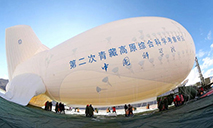U.S. military Osprey aircraft makes "unusual" landing at airport in Japan
TOKYO, May 20 (Xinhua) -- A U.S. military Osprey aircraft made what local media described as an "unusual landing" at an an airport in Japan's southwestern prefecture of Kagoshima on Friday.
The tilt-rotor aircraft made the landing just 10 minutes after the airport was notified, suggesting the landing was emergent in nature.
There have been no immediate reports of injury as a result of the irregular landing, nor have commercial flights at the airport been affected, according to local media reports.
Prefectural officials said the Osprey arrived at Amami Airport on Amami Oshima Island around 10:00 a.m. local time, with defense ministry authorities saying the plane is believed to belong to the USS Abraham Lincoln aircraft carrier.
The prefecture and defense ministry are looking into the reasons behind the unusual landing, local media reported.
The accident-prone tilt-rotor aircraft, which can take off and land like a helicopter and fly like a fixed-winged plane, have concerned the public and officials across Japan due to its checkered safety history since its design phase.
A U.S. Marine Corps MV-22 Osprey made an emergency landing in Japan's Oita Prefecture, on the eastern coast of Kyushu, in August 2017, with a similar plane making a crash-landing off Nago in Okinawa in December 2016.
The turboprop plane was also involved in a fatal crash off the coast of Australia in August 2017 that killed three personnel aboard.
Its loud turboprop engines have also been the cause of irritation leading to noise pollution lawsuits being filed by local residents here living in the vicinity of airports and bases where the controversial plane is deployed.
Photos
 China’s central bank to issue commemorative coins on cultural theme of auspiciousness, including two heart-shaped coins
China’s central bank to issue commemorative coins on cultural theme of auspiciousness, including two heart-shaped coins Population of endangered black-headed gulls exceeds 10,000 mark in NE China’s coastal city of Panjin
Population of endangered black-headed gulls exceeds 10,000 mark in NE China’s coastal city of Panjin China's self-developed floating airship breaks record
China's self-developed floating airship breaks record Chinese germplasm bank conserves biodiversity in warm temperate zone
Chinese germplasm bank conserves biodiversity in warm temperate zone
Related Stories
- Japan's nuclear regulator approves plan to discharge radioactive wastewater from Fukushima plant into ocean
- Japan's Okinawa marks 50th reversion anniversary
- World Insights: Blood, tears, discrimination -- the past and present of Japan's Ainu people
- Int'l community voices concerns over Japan's planned release of radioactive wastewater
- Biden plans Japan visit to coordinate Indo-Pacific, but ‘India’s reluctance to sway on Ukraine weakens QUAD’
Copyright © 2022 People's Daily Online. All Rights Reserved.






